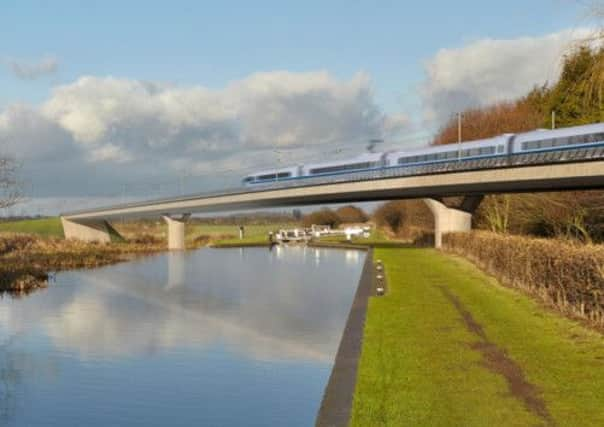James Reed: Uneasy bedfellows must stay on track and make the case for high-speed rail


Days later, the Institute of Directors produced a survey suggesting that the business world did not see the economic case for the new line, which was described by its director-general as a “grand folly”.
Suspicions that Mr Darling could be acting as an outrider for the Labour frontbench, paving the way for a withdrawal of the Opposition’s support, appeared to be confirmed when Shadow Chancellor Ed Balls warned there would be “no blank cheque” from a future Labour government.
Advertisement
Hide AdAdvertisement
Hide AdWhat a change in mood from January, when the whole Cabinet decamped to Leeds to announce the green light for the second phase of the line from Birmingham to Sheffield, Leeds and York to broad welcome.
In reality, those few days in August were the logical conclusion to preceding months of growing concern about the project. Gripes about the route, planning blight, compensation, location of stations and cost had been growing louder by the month.
But just as all life appeared to be ebbing out of the HS2 project, Chancellor George Osborne staunched the flow with his personal backing – repeated yesterday – and Labour’s response to Monday’s critical Public Accounts Committee report, while reiterating its “blank cheque” line, also said the party was “firmly committed” to the project.
Tomorrow, Transport Secretary Patrick McLoughlin will try and put HS2 back on track with a speech that stresses the line is needed to cope with future demand for train travel and downplays the significance of shorter journey times – the original selling point of the scheme.
Advertisement
Hide AdAdvertisement
Hide AdIf he is to succeed in his mission, Mr McLoughlin will need more vocal and united support from the “yes” camp.
HS2 brings together unlikely bedfellows in the shape of overwhelmingly Labour political leaders in the North and a Conservative-led Westminster Government which is asking them to make unprecedented budget reductions.
But however uneasy this coalition might be, it needs to find a louder and more coherent voice if it wants to see HS2 become a reality.
And the new focus on capacity rather than speed is a chance for the “yes” campaign to bring large numbers of waverers back into the fold.
Advertisement
Hide AdAdvertisement
Hide AdSpeed has been a driving factor behind the argument for the route, number and location of stations. If journey times are no longer to be the key measure, that creates scope for changes to the project which could bring immediate benefits to more areas.
The case for a city centre station in Sheffield, rather than at Meadowhall as currently planned, for example, suddenly becomes easier to make.
Recent work by transport authorities in Yorkshire has already shown how tweaking proposals for use of the existing network after HS2 is built could improve (rather than downgrade as originally suggested) journey times and frequency of services. The pro-HS2 lobby needs to embrace this approach and evolve into a comprehensive co-ordinated trans-Pennine campaign for improved North-South rail travel on networks old and new.
Far greater certainty over compensation for those whose lives will be disrupted would remove one of the major sources of objection. As the Country Land and Business Association has argued, it is unfair that the Government should publish detailed maps of the proposed route, casting a shadow over the future of homes and businesses, but insist discussions about compensation, beyond the tightly-defined exceptional hardship scheme, must wait.
Advertisement
Hide AdAdvertisement
Hide AdA clearer message on the economic benefits from construction is needed too. Leeds has shown how major schemes such as the First Direct Arena and Trinity Leeds shopping centre can be used to create large numbers of apprenticeships that have will have benefits well beyond the lifetime of the project.
Finally, there should be one area where “yes” and “no” campaigners in Yorkshire can find common ground.
One of the most seductive arguments from the naysayers is the idea that if HS2 was scrapped, the billions “saved” could be spent in other ways with greater impact.
It would be nice to think that in a Whitehall vault there is a pile of money labelled “transport outside London” ready to spend on HS2 or something else.
Advertisement
Hide AdAdvertisement
Hide AdThe reality is that if HS2 was scrapped tomorrow the funding would likely disappear with it.
That is why both sides of the HS2 debate in the North should make the starting point of their arguments the need for significant transport investment to help unleash the untapped economic potential of the regions. This will take on added significance as momentum grows behind plans for Crossrail 2 in the capital.
There is no doubting the integrity of the two sides of the HS2 argument.
It is vital that in the months ahead this honest debate is not conducted in a way that gives a future government or Chancellor political cover to give the North yet another raw deal on transport.
*James Reed is the Yorkshire Post’s political correspondent.